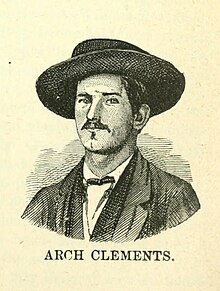Archie Clement


Archie Clement (January 1, 1846 – December 13, 1866), also known as "Little Arch" or "Little Archie", was a pro-Confederate guerrilla leader during the American Civil War, known for his brutality towards Union soldiers and pro-Union civilians in the state of Missouri.
Little Archie, the bushwhacker
Clement was born in Stokes County, North Carolina and brought to Missouri with his family as a toddler.[1] By the beginning of the Civil War, he and his family were recorded as living in Big Creek Township, Cass County, Missouri.[2] A Confederate "bushwhacker" or guerrilla during the Civil War, Clement rose to notoriety in 1864 as a lieutenant of William "Bloody Bill" Anderson. Clement soon became known as Bloody Bill's most trusted follower—or, in the words of an enemy, "Bill Anderson's scalper and head devil." Standing just over five feet tall and weighing about 130 pounds, Clement's youth and slight stature belied his ferocity. Anderson (or one of his men) left this note on the body of a dead Unionist after a particularly vicious skirmish: "You come to hunt bush whackers. Now you are skelpt. Clemyent skelpt you. Wm. Anderson."[3]
Clement took a prominent role in all of the major operations of Anderson's organization in 1864, including the Centralia Massacre, in which the guerrillas blocked the tracks of the Northern Missouri Railroad and forced a train to stop. They then robbed the civilian passengers and killed 22 unarmed Union soldiers found on board, who had been returning home on furlough from the Atlanta campaign. Anderson left one Union sergeant alive for a possible prisoner exchange. The guerrillas shot the rest, and scalped and otherwise mutilated the corpses.[4]
Following Anderson's death in an ambush by Union militia on October 27, 1864, Clement took command, continuing to fight into the next year. Following the surrender of General Robert E. Lee's army in Virginia, Clement's band of guerrillas persisted, even demanding the surrender of the Missouri town of Lexington. Though some comrades, including Dave Poole, surrendered, Clement and Jesse James remained under arms. On May 15, 1865, Clement and James encountered a Union cavalry patrol; a skirmish ensued in which James was severely wounded.[5]
Clement, the outlaw leader
Beginning in 1866, Clement led his supporters into a new profession: bank robbery, especially of banks associated with Missouri Unionists. On February 13, a group of gunmen carried out the first daylight, peacetime, armed bank robbery in U.S. history when they held up the Clay County Savings Association in Liberty, Missouri, stealing more than $58,000 in cash and bonds. The bank was owned and operated by former Union militia officers, who recently had conducted the first Republican Party rally in Clay County's history. The state authorities suspected Archie Clement of leading the raid and offered a reward for his capture. In later years, the list of suspects would grow to include Frank James, Cole Younger, John Jarrette, Oliver Shepard, Bud and Donny Pence, Frank Gregg, Bill and James Wilkerson, Joab Perry, Ben Cooper, Red Mankus and Allen Parmer (who later married Susan James, Frank and Jesse's sister). During the escape through the streets of Liberty, one of the gang shot dead an innocent bystander named George Wymore.[6] A string of robberies followed, many linked to Clement's gang. The hold-up most clearly linked to them was of Alexander Mitchell and Company in Lexington, Missouri, on October 30, 1866, in which they stole $2,000.
Death
As the pivotal election of 1866 approached, political violence flared across Missouri. Much of it was associated with Archie Clement, who harassed the Republican authorities who governed Missouri. On election day in November 1866, Clement led a group of some 100 former bushwhackers into the town of Lexington. Their gunfire and intimidation led to the defeat of the Republican Party in the election. In response, Governor Thomas C. Fletcher dispatched a platoon of state militia, led by Major Bacon Montgomery. Clement withdrew, only to return on December 13, 1866. Seeking to avoid a major battle in the center of town, Montgomery allowed Archie Clements to enroll his men in the state militia (as a joke, it seems); after the bushwhackers left, Clement went to the bar of the City Hotel for a drink.
Seeing his opportunity, Montgomery dispatched a few men to apprehend Clement, who was wanted on a warrant for the Liberty robbery. The major's men found Little Arch drinking with an old friend and called out for him to surrender. Clement drew his revolvers and a wild gunfight ensued. Despite having sustained a gunshot wound to the chest, Archie managed to make it outside and onto his horse. Clement rode up the town's main street in an effort to escape only to be shot off his horse by a militia detachment stationed at the courthouse. Montgomery and his men approached the fallen bushwhacker, who, though mortally wounded, was trying to cock his revolver with his teeth. One of the soldiers asked, "Arch, you are dying. What do you want me to do with you?" Clement replied, "I've done what I always said I would do ... die before I'd surrender." Major Montgomery himself later stated of Clement's final moments, "I've never met better 'grit' on the face of the earth."[7]
After Arch Clement's death, his organization continued to rob and be pursued by government troops. Out of this group rose Jesse James, who first achieved notoriety three years later. Archie Clement is buried in the Arnold Cemetery near Napoleon, Missouri.
See also
References
Further reading
- Edward E. Leslie,The Devil Knows How to Ride: The True Story of William Clarke Quantrill and His Confederate Raiders
- Yeatman, Ted P.: Frank and Jesse James: The Story Behind the Legend, Cumberland House, 2001
- Stiles, T.J.: Jesse James: Last Rebel of the Civil War, Alfred A. Knopf, 2002
